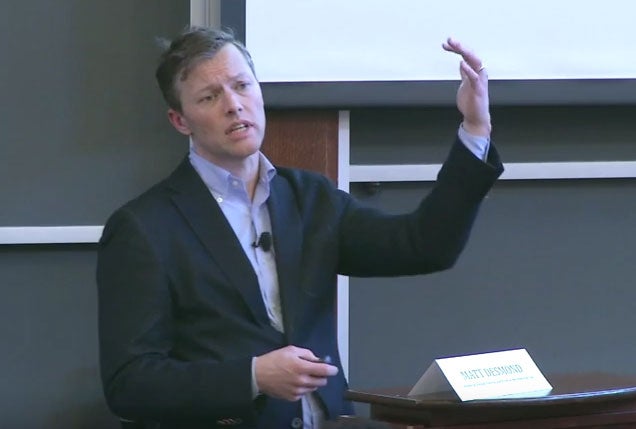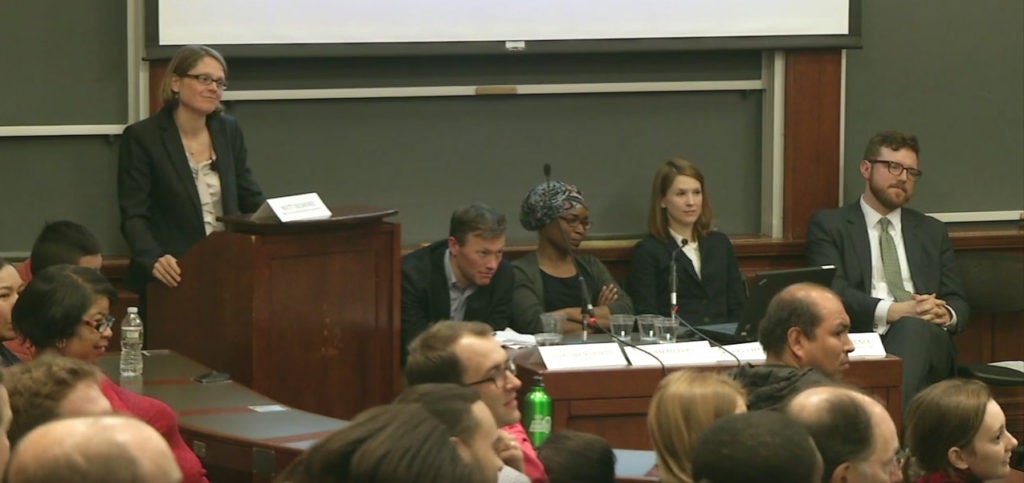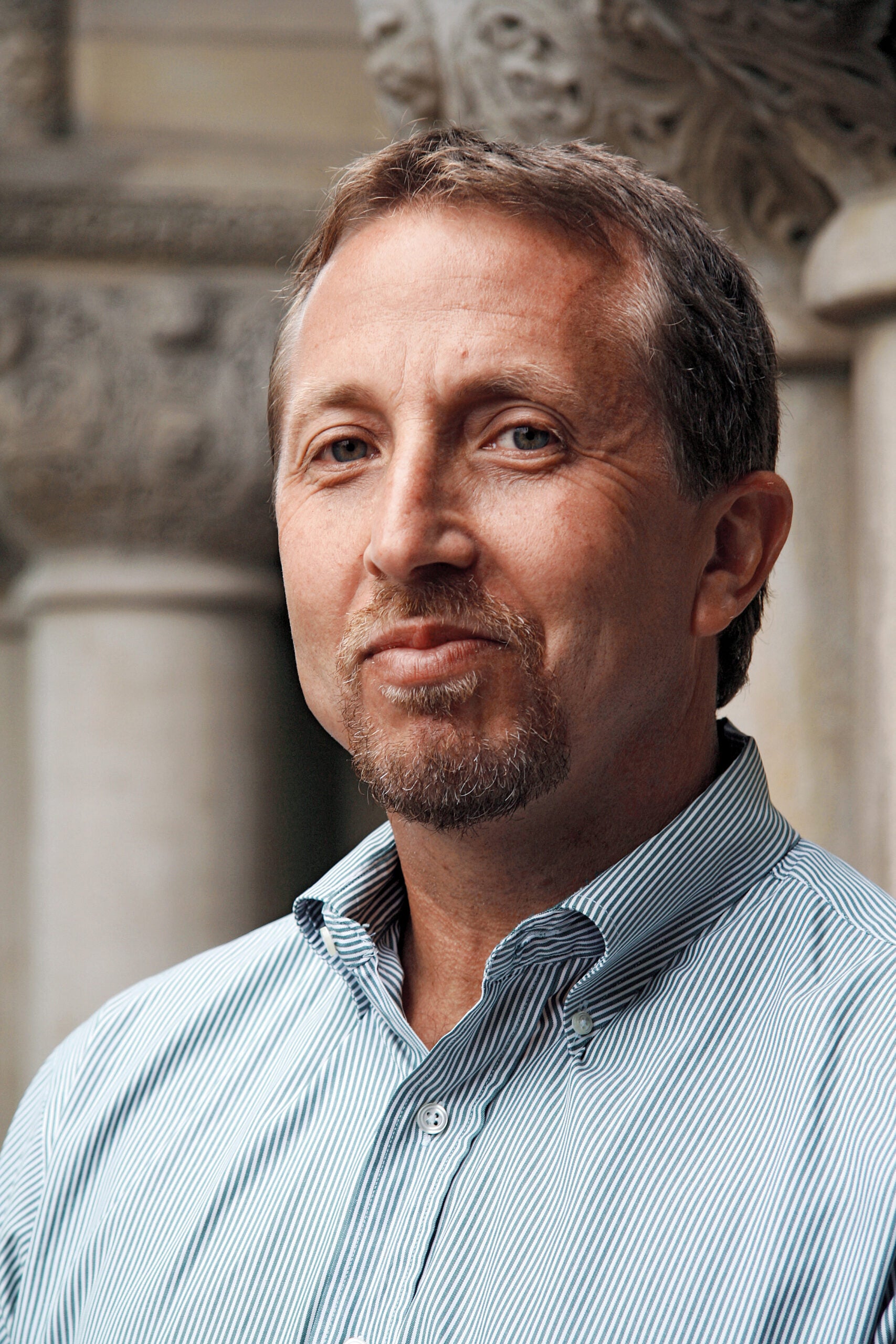The David Grossman Memorial Lecture, entitled “Eviction, Displacement, and the Fight to Keep Communities Together,” was held at HLS on April 5. Grossman ’88, who died last July, was a lawyer and teacher dedicated to serving the poor, and he was Director of the Harvard Legal Aid Bureau for close to a decade.
In introductory remarks to a packed room in Austin Hall, Dean Martha Minow reflected on Grossman’s work “strengthening tools and spirit, both necessary for helping people in need, for changing laws and enforcing laws, and changing the politics around those laws.”
“With formidable intellect, constant courage, David brought tremendous humility, humor, friendship, outstanding sunglasses to every encounter, and he elevated allies and opponents alike,” Minow said. “He modeled what it is to engage in the world with respect for every person, even if you disagree with them.”
Minow introduced the lecturer, sociologist Matt Desmond, as “a champion for the goals and the values and the humanity exemplified by David Grossman and advanced by him every day.”

Desmond, a MacArthur “Genius” grant winner who published the book “Evicted: Poverty and Profit in the American City” in March, is John L. Loeb Professor of the Social Sciences at Harvard University and co-director of the Justice and Poverty Project.
Desmond shared his experiences living in a trailer park and an inner-city rooming house in Milwaukee as part of his sociological research. He spoke about how he integrated into the lives of his neighbors. He focused on a mother named Arleen and her two young sons, and the family’s struggle to find stable housing.
“The home is a center of life,” Desmond said. “It’s the well-spring of personhood. It’s our refuge from work and the menace of the streets. … In languages spoken all over the world, the word for ‘home’ encompasses not just shelter but warmth, family, the womb.”
Eviction causes loss, said Desmond, and it can bar people from receiving government help and cause workers to lose their jobs. “Eviction is not just a condition of poverty; it’s a cause of it. It’s making things worse. We can’t fix poverty in America if we don’t fix housing,” he said.
“I think housing should absolutely be a right to everyone in our country and the reason is very simple: without stable shelter everything else falls apart.”
To deliver on that obligation, Desmond proposed, we should create a universal housing voucher program. “Instead of paying 88%, 70%, 60% on housing, if you had a voucher, you could take that voucher and live anywhere you wanted, as long as your housing wasn’t too expensive or too shoddy, and you could pay 30% of your income on housing, with the voucher covering the rest. That would fundamentally change the face of poverty in America. It would drive down evictions. It would drive down homelessness.”
Desmond addressed the question of how the country would afford such a program: “Some economists have argued that if we take the housing voucher program that we have and make it more efficient, we can extend the program to all families below the poverty line without much additional spending. If we did nothing to make the housing program more efficient, it would probably cost us an estimated $22 billion a year. That’s not a small figure, but it’s also one that’s well-within our capacity.”
“We have the money; we just make choices about how to spend it,” he said. “Today, housing related tax expenditures—like the mortgage income tax deduction—far outpace those for housing assistance to poor renters. Most federal housing subsidies benefit families with six-figure incomes. If we’re going to spend the bulk of our public dollars on the affluent, at least when it comes to housing, let’s just be honest about that, let’s just own up to that, and stop repeating the canard that this wealthy nation can’t afford to do more,” he said.
“But I think one thing is certain: this degree of inequality, this cold denial of basic rights, this blunting of human capacity, this level of social suffering—this isn’t us. This doesn’t have to be us. By no American value is this situation justified. There’s no ethical code, or holy teaching or Scripture, that can be summoned to allow us to defend what our country has become.”
Following Desmond’s remarks, housing activists participated in a panel discussion led by Eloise Lawrence, a clinical instructor at Harvard Legal Aid Bureau who worked with Grossman on Project No One Leaves. The panel discussion focused on the work the panelists are doing in their communities, and what they have witnessed.
Panelists included, Adam Meyers ’13, a staff attorney at Brooklyn Legal Services Corporation; Kerry Chance, a lecturer on Social Studies and an Oppenheimer Fellow at Harvard University’s Hutchins Center for African and African American Research; and Lisa Owens, executive director of City Life/Vida Urbana.

Meyers, who worked with Grossman on Boston housing issues as a student leader and now represents tenant associations and community groups fighting displacement in North and East Brooklyn, N.Y., described the problems wrought by gentrification in the communities he works with, primarily Williamsburg, Greenpoint, and Bushwick. “These are communities that, 40 years ago, were populated largely with recent immigrants. These are folks who, when nobody else wanted to live here, when private capital had abandoned these neighborhoods, these folks moved in, they worked together, they forced out the drug dealers, they repaired their own housing, sometimes they went through legal procedures to become cooperative owners of this housing.”
“They built these neighborhoods, and now that these neighborhoods are attractive, they are being pressured out by the rising rents,” he said.
Chance, who has done extensive ethnographic and historical research in Cape Town, Durban, and Johannesburg, South Africa and is currently writing a book on South Africa’s urban poor entitled “Living Politics,” said South Africa’s modern history “could be told through successive evictions.”
“The apartheid era enforced segregation between 1948 and 1994 was achieved though housing resettlement, when millions were forced to relocate,” Chance explained. “With the election of Nelson Mandela, housing became not only a right enshrined in the new South African constitution in 1977, but moreover a cornerstone of nonracial democratic citizenship, the material goods of a new social contract forged out of mass struggle.”
“Yet evictions never abated in poor communities” and in fact evictions have begun to intensify since the mid-1990s, Chance said.
Chance shared the story of Monique, a Cape Town domestic laborer who cycled between evictions and homelessness with her young children. Eventually, after a violent eviction that involved police shooting rubber bullets into a crowd, Monique and others like her formed the Poor People’s Movement, also known as the Anti-Eviction Campaign.
“As this story suggests, residents in South Africa and the United States are finding themselves at the tail end of very similar global processes, for instance, neoliberal policy reforms and aggressive cost recover,” Chance said. “Yet there are important differences that play out on national and local scales, notably that in South Africa, the primary interlocutor—the agents evicting you, appearing in court, and yes, profiting—tends to be nested within the state, whereas in the U.S. it tends to be in the banks or corporations.”
Owens spoke next. Her organization, which is based in Jamaica Plain, focuses on promoting tenant rights and preventing housing displacement. Describing Boston as “a city of renters,” Owens discussed the ongoing effects of the foreclosure crisis.
“Communities of color in Boston overwhelmingly and disproportionately bore the brunt of this major transfer of wealth,” she said. “Homeowners whose life savings were literally sunk into their homes—all of that vanished, so those people joined the large pool of renters in the city. So there’s more competition, but their income didn’t rise.”
“We’ve got corporate investors buying up the existing housing stock, we have new luxury development being constructed in the city of Boston, and all of this contributes to the skyrocketing housing costs. So we’re being squeezed by multiple angles.”
“What’s happening is that working class people who otherwise would have been able to afford renting in Boston are seeing their rent doubled, tripled, and in some cases quadrupled,” Owens said. “Really, it’s a cleansing of the city, either by design or by happenstance. What’s happening is that low-income people are being pushed out.”
Owens, executive director of City Life/Vida Urbana, explained how her organization is “a tenant and homeowner movement” that holds weekly meetings where more than 100 people gather to work together on their housing problems. The organization addresses housing issues with a two-sided approach, combining the “sword” of collective action with the “shield” of legal defense in housing court.
She illustrated her City Life’s “sword and shield” strategy by telling the story of a tenant who, after receiving notice of an exorbitant rent increase, worked with the organization’s legal team to negotiate better terms not only for herself but also for her neighbors.
“We have lots and lots of stories about how, when we fight together, one person’s case actually has this ripple effect,” Owens said.
